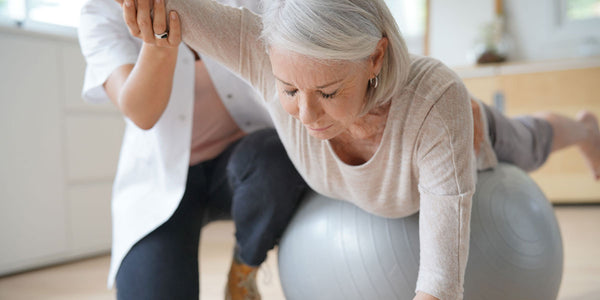Your Cart is Empty
Injury

If you are a contact sports athlete, have fallen hard on your shoulder, or just had some back luck that results in shoulder pain, there is a good chance you’ve dislocated your shoulder. The shoulder joint is one of the easiest and most vulnerable joints to dislocate. It’s made up of a ball and socket joint, where the ball of the humerus lies in a shallow socket of the shoulder. With shoulder dislocation, recovery involves several steps to protect your shoulder and prevent further injury. Keep reading to learn more.
Immediately after you suspect you have dislocated your shoulder you should immobilize it. This means avoiding all arm and shoulder movement. This will prevent any additional damage to the area. An arm sling can help you keep your arm still until you are able to receive treatment.
The primary goal of treating a dislocated shoulder is to get the ball of the humerus back into the socket. This should be done by a healthcare professional to prevent additional injury to the ligaments, nerves, and blood vessels.
A closed reduction is a procedure where a healthcare professional moves your arm around the shoulder joint to position the humerus back into the socket. This may be done under light sedation to relax your muscles. The procedure usually takes only minutes but complex cases can take longer. After a closed reduction, your doctor may order an x-ray to look for bone fractures and alignment.
With closed reduction, your doctor will likely ask you to immobilize your arm for a period of time. An arm sling will help you immobilize the upper arm and shoulder to prevent dislocating your arm and give you some added support as you heal.
Surgery is generally only needed for people who have repeatedly dislocated their shoulder or have an injury to the ligaments, nerves, blood vessels, or shoulder tissues. An orthopedic surgeon will discuss with you the benefits and risks of the surgery. After the surgery, your immediate recovery will take place in the hospital but you usually can go home the same day.
If this is the first time you’ve dislocated your shoulder you might be surprised by how quickly the pain subsides, yet how long a full recovery can take. Here are the best ways you can manage your pain and recover more efficiently.
Rest should be your primary focus the weeks and months after a shoulder dislocation. Now is not the time to start a house project or new active hobby. Keep your arm down near your side. Avoid heavy lifting, the pulling can injure your shoulder joint. Don’t make any overhead or overreaching movements. Wearing an arm sling will help you keep your arm down and serve as a reminder to let it rest.
Cold therapy is a great treatment option for your recovery from a dislocated shoulder. The cold will lessen pain by interrupting the pain signal and reduce swelling in the soft tissues. Use a shoulder ice wrap to cool down the entire shoulder area while also applying some slight compression. Use an ice wrap for 20 minutes at a time for the first two days after the injury.
After the initial injury phase has passed, about 72 hours, you can start using heat. Heat will soothe your sore shoulder muscles, encourage blood flow to the area, and improve healing time. This can be accomplished through a heating pad or even a warm towel on the shoulder. Just like a cold pack, use heat for 20 minute intervals and avoid sleeping with a heat source as it can cause serious skin injury.
Tips for Alternating Hot & Cold Therapy
A physical therapist is a perfect resource for someone recovering from a shoulder injury. They will guide you through a series of exercises and range of motion movements to help you regain muscle strength and shoulder flexibility. To make a full recovery, it’s important to keep your follow-up appointments with your physical therapist and perform the recommended exercises.
Effective Shoulder Dislocation Exercises
After a shoulder dislocation, you can experience shoulder instability until your shoulder has fully recovered. Thankfully, there are several mobility aids that are available to assist you during this phase. A rotating reacher can help you reach items that are high in a closet or shelf. This is a perfect tool to use when you cannot reach overhead. A dressing stick will reduce the amount of bending and twisting of your arm and shoulder as you put on your tops.
A dislocated shoulder is a painful shoulder injury that takes anywhere from 12 to 16 weeks to completely heal. Many people can slowly begin activities after 2 weeks but need to avoid heavy lifting and shoulder movements for 12 weeks. Your recovery can be managed with ice, heat, immobilization, and exercise. Work with your healthcare professional to determine the best recovery plan for your injury and situation, every patient will be different.
Sources:
https://medlineplus.gov/dislocatedshoulder.html
https://medlineplus.gov/ency/patientinstructions/000524.htm
https://www.nhs.uk/conditions/dislocated-shoulder/
Dislocated Shoulder Products

![The Benefits of Flexibility [A.K.A. The Secret Sauce for Aging]](http://www.vivehealth.com/cdn/shop/articles/Smiling-retired-woman-listening-to-music-while-stretching-legs-outdoors._600x.jpg?v=1713090677)
